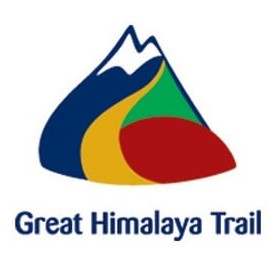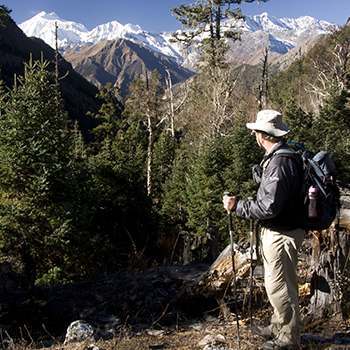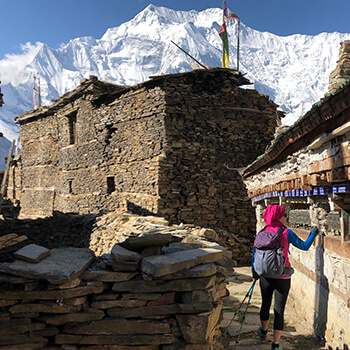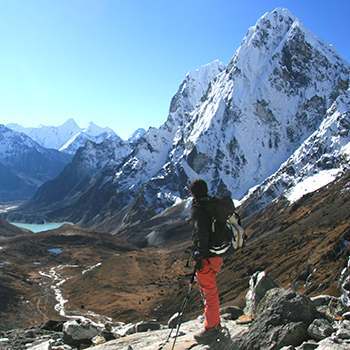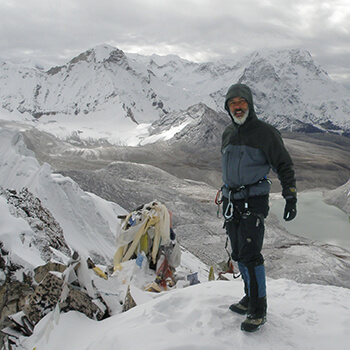GHT Bhutan Treks
The last of the Himalayan Kingdoms, Bhutan, offers you a trekking experience like nowhere else on earth. Our GHT Bhutan Treks are where tranquility and natural beauty combine into what many consider trekking perfection.
The whole country feels like a final frontier. Sandwiched between Sikkim, Tibet, and the untamed wilderness of Arunachal Pradesh, Bhutan is a natural fortress. Immense forests buffer and protect against potential invaders. For the locals, the mountains are both spiritual inspiration and a life sustaining resource.
Maybe it’s all the trees pumping oxygen into the crisp mountain air? There is something very special about hiking in Bhutan, it refreshes, reinvigorates and reminds you how easy it is to live a natural life in harmony with nature.
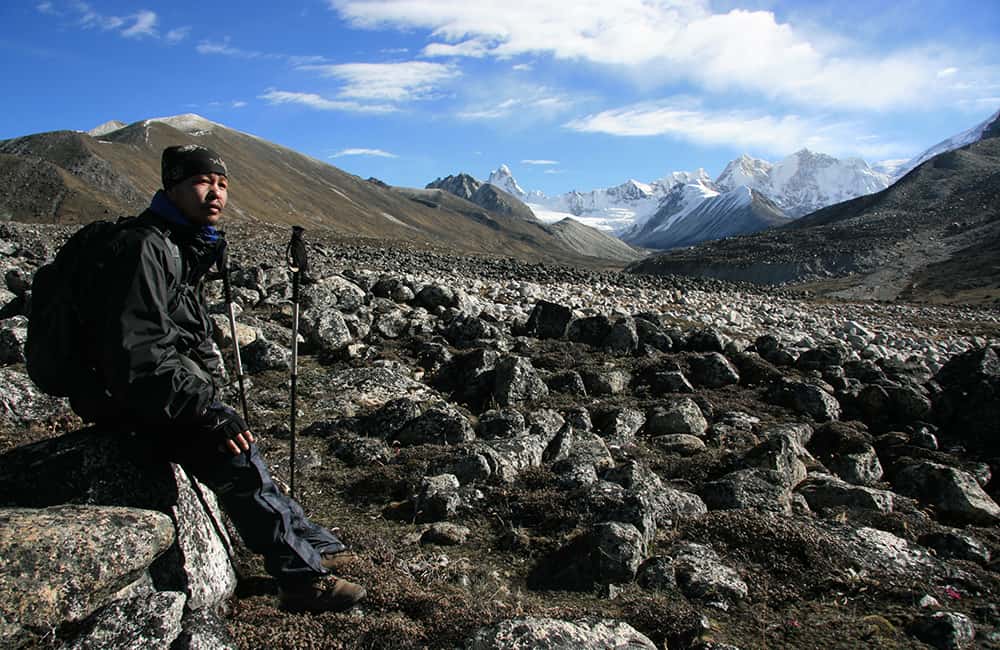
Relaxing on the Gopher La

Local’s are always happy meetings on the trail
Bhutan: A Buddhist Mountain Kingdom
Buddhism dominates every aspect of day-to-day life in Bhutan. Politeness and respect are never overwhelmed by anger or hostility. Life in Bhutan transcends the material as locals believe the world is full of spirits that could bring havoc if not kept happy. Perhaps that is why the King’s concept of Gross National Happiness is so important to the locals? GNH includes the world of spirits and ancestors who are venerated every day.
Self-enforced isolation for much of its history is slowly being replaced with tentative interactions with other countries. Recent satellite communications have bought email and restricted cable TV access to people who knew little about the ‘outside’ world. Many Bhutanese continue to argue against ‘westernised development’ and believe that the preservation of a way of life that embraces nature and organic living is far more important than daytime TV and social media.
In 2010, the King announced that all of his country’s northern, mountainous regions would become National Parks or conservation areas. Seen as both natural heritage and resource, these forests and wilderness areas are key to the country’s future eco-tourism goals and sustainable agricultural projects. With a population of less than 500,000, Bhutan has changed little since the sixteenth century and the residents intend to maintain that record.
GHT Bhutan Trek Summary
It’s possible to trek across the GHT Bhutan in a single trek, but we receive questions about doing it in sections… so, the three treks on the website can be joined together if you want an all-in-one-go journey.
We’ve included a few travel time days to each of the three sections, which makes the overall journey longer.
GHT Bhutan Trek all-in-one-go:
- Total Trek 36 days over about 500km
- 18 passes (three over 5000m)
- 40,000m of ascent and descent
GHT Bhutan in Sections:
- East Bhutan (13-days with 10 trekking): from Trashi Yangtse trek over Dong La and Rhodung La to Bumthang
- Central Bhutan (18-days with 15 trekking): trek from Bumthang over Gophu La (Snowman Trek) to Laya
- West Bhutan (12-days with 9 trekking): trek from Laya via Lingshi and Jomolhari to Haa then to Paro.
Do you have some questions? Feel free to Get in Touch, we’re here to help.
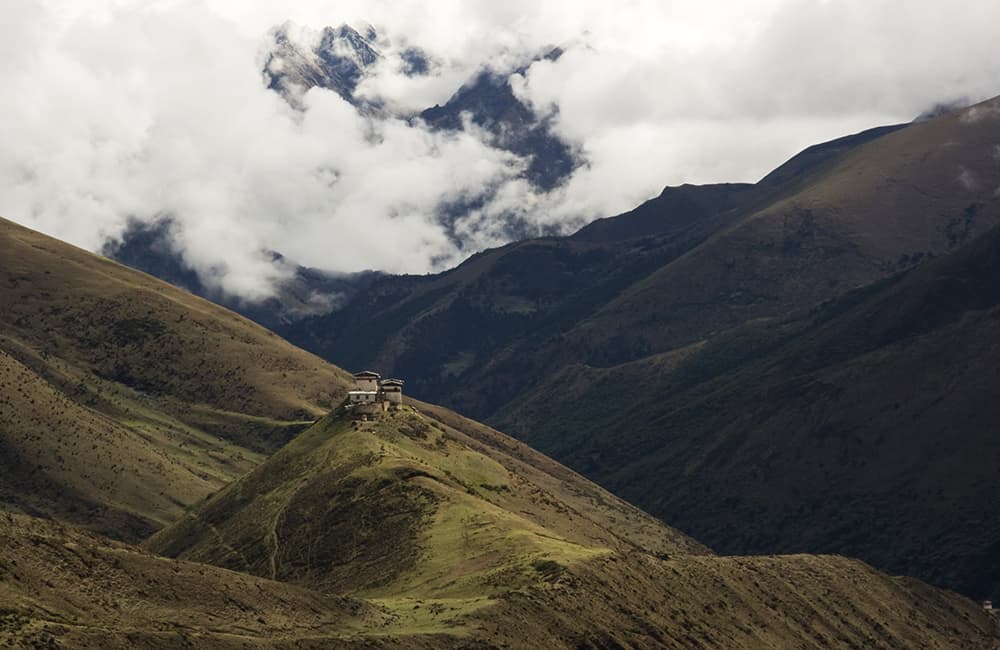
GHT Bhutan Treks Map
You can trek across the GHT Bhutan east to west or west to east as you prefer.

GHT Bhutan Trek Itinerary Summary
Combine Tour Plans for daily descriptions.
Day – Route – Time Duration
1 Fly/Drive to Samdruk Jongkhar
2 Drive to Trashigang, 10hrs
3 Trashigang to Trashi Yangtse, 3hrs
4 Trashi Yangtsi to Taupang, 5.5hrs
5 Taupang to Pimi, 9hrs
6 Pimi to Minji, 3.5hrs
7 Thangmachu and Lhuntse, 1.5hrs
8 Tangmachu to Ungar, 8.5hrs
9 Ungar to Pemi, 5.5hrs
10 Pemi to Bumthang, 9hrs
11 Bumthang to Tangbe, 7.75 – 8.5hrs
12 Tangbe to Chochomey, 4.25hrs
13 Chochomey to Kurpang, 6hrs
14 Kurpang to Djule Tsho, 6.75hrs
15 Djule Tsho to Dur Tshachu, 3hrs
16 Dur Tsachu to Warthang, 5.75hrs
17 Warthang to Minchugang, 5.5hrs
18 Minchugang to Zanum, 5.5hrs
Day – Route – Time Duration
19 Zanum to Tshorim, 4.5hrs
20 Tshorim to Thanza, 5hrs
21 Thanza to Lhedi, 3.75 – 4.75hrs
22 Lhedi to Wochey, 5.75hrs
23 Wochey to Tarina, 5.75hrs
24 Tarina to Narithang, 6.25hrs
25 Narithang to Rodophu, 4.75hrs
26 Rodophu to Laya, 6hrs
27 Laya to Limithang, 4hrs
28 Limithang to Thankhasam, 7hrs
29 Thankhasam to Shakyapassa, 5hrs
30 Shakyapassa to Tekethang, 6hrs
31 Tekethang to Jangothang, 5.5hrs
32 Jangothang to Takengthanka, 3.5hrs
33 Takengthang to Shana, 5hrs
34 Shana to Balakha, 4.75hrs
35 Balakha to Haa, 5hrs
36 Drive to Thimpu/Paro
GHT Bhutan Trek Pricing
All visitors to Bhutan must use a government-authorised travel agent. There is no limit to the number of tourists who can visit the country in any year, however, what appear to be high costs deter many.
Your daily fee includes your visa and permits, accommodation, transport and food costs (drinks are extra), and a conservation fee that goes directly to projects across the country. Compared to tea-house trekking in Nepal, Bhutan appears to be more expensive, but the experience is incomparably different.
Calculating costs for trekking in Bhutan is simple:
- Fixed daily cost: $250/person/night includes a $65/day Conservation Fee.
- Note for 1pax and 2pax a per person surcharge applies of $40 and $30 respectively.
So, this multiplies out as:
- Solo GHT Bhutan Trek Cost = US$10,440 per person
- Twin Share GHT Bhutan Trek Cost = US$10,080 per person
- Group of 2+ trekkers, GHT Bhutan Trek Cost = US$9,000 per person
For the GHT Bhutan Sections:
- East Bhutan, 13-days = $3,250 per person
- Central Bhutan, 18-days = $4,500 per person
- West Bhutan, 12-days = US$3,000 per person
Mr Anan Loza, Keys to Bhutan, Thimpu
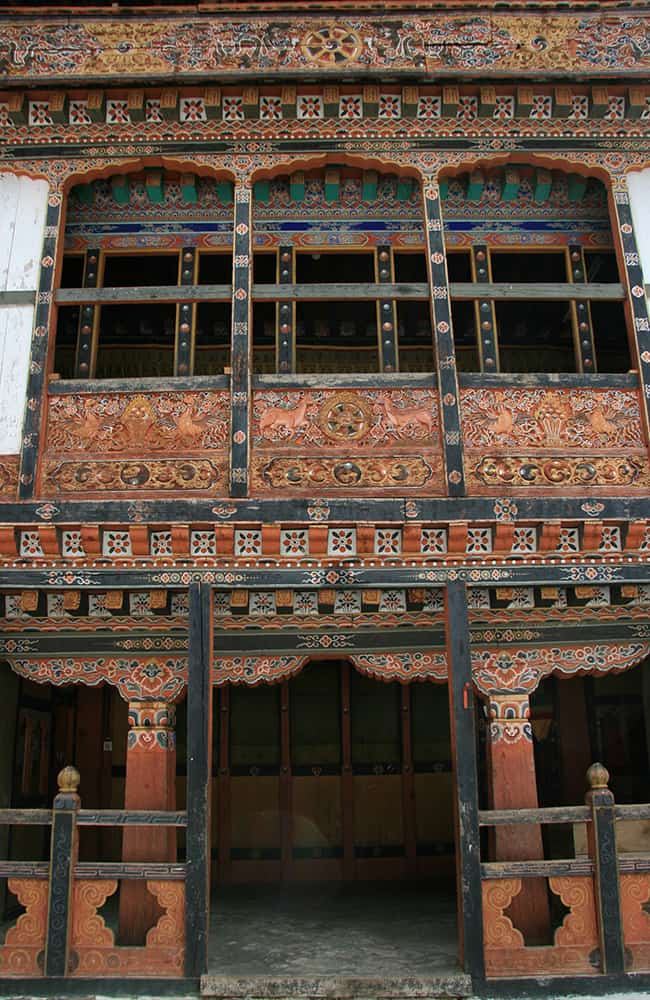
Inside Lhuentse Dzong
GHT Bhutan Trek – Social, GHG and Waste Impacts
Bhutan is not a wealthy country, so the dedication to sustainable and responsible tourism is even more impressive. It is possible to influence some decisions for local payments, but your guide and cook will probably make most of the decisions. However, feel free to ask them why they choose certain places to buy things, and between brands. You will be surprised by how conscious they are about buying local and helping distribute benefits from tourism.
The impacts of your trek are a little difficult to calculate in Bhutan as the conservation fee is such a significant amount of your daily cost. However, we assume that it used in ways that off-set your footprint, although you do not have any control over how it is spent.
Social, GHG and Waste Impacts of the GHT Bhutan Full Trek

The Trade Off
The social impact of trekking in Bhutan is relatively low because of the relatively high daily conservation fee. However, the fee more than offsets your GHG and Waste impacts. This makes your trek very good news for Bhutanese and the planet!

GHT Bhutan Trek Planning & Logistics
Planning is simple, there are a limited number of trails visitors are allowed to use. So your decision is pretty straight forward, which one or combination of them you wish to follow? The treks on this site cover the higher sections of all of Bhutan’s official trekking routes. You can go beyond them in some places, but it’s tricky and will require negotiation.
Food while on trail is frequently more varied and tastier than that offered in hotels, even compared to places like Thimpu. However, food is probably the source of more complaints than anything else for visitors to Bhutan. If you are willing to try new dishes and keep an open mind you’ll find Bhutanese cuisine is nutritious and a great ice-breaker with the locals. If you have specific dietary needs it is essential you tell your agent well in advance.
Pack animals are used throughout Bhutan, so all trails are pretty easy to follow. Although the eastern section over the Dong La (between Lhuentse and Tashi Yangtsi) is very rough.
Important Note: pack animals, especially horses, can find snow covered ground difficult to cross, so don’t be surprised if you are turned back on a trail after a large storm.

Getting Around Bhutan
Nearly all travel in Bhutan is by road, so getting to and from your trek will probably involve a car trip. Typical drive times are:
Route – Distance – Average Drive Time
Haa to Paro over Chele La 68km 2.5hrs
Paro to Thimpu 65km 45mins
Thimpu to Punakha 77km 2.5hrs
Paro to Taktseng car park 10km 30mins
Punakha to Bumthang 210km 6.5hrs
Bumthang to Yangtsi 288km 10hrs
Samdruk Jongkhar to Trashigang 180km 9hrs
Trashigang to Yangtsi 65km 2.5hrs

Jichu Drakey campsite
Food in Bhutan
A common first main meal is boiled asparagus, mixed veggies in chilli, ema datchi (boiled chilli and cheese) and pork in chilli and rice. The local chilli isn’t very spicy and tastes much like capsicum. Both chilli and cheese appear regularly in most dishes because Bhutanese like to eat them at least once a day.
Continental and Indian style food is rare, although Chinese dishes make an occasional appearance. You can only find pastries and the like in Paro and Thimpu. Having said that, every meal is nutritious, well cooked and with a very limited range of ingredients it would be difficult to make anything much different.

Ema Datchi is Bhutan’s favourite dish
Make sure you have time to visit Punakha Dzong while in Bhutan.

For more Information about GHT Bhutan Treks and things to do:
General interest and country info:
Web: http://en.wikipedia.org/wiki/Bhutan
Lily Wangchhuk. Facts about Bhutan Land of the Thunder Dragon, Absolute Bhutan Books 2008.
Insights into daily life and beliefs:
Ashi Dorji Wangmo Wangchhuck. Treasures of the Thunder Dragon, Penguin 2006
Michael Peissel. Lords and Lamas, Heinemann 1970
Jamie Zeppa. Beyond the Sky and the Earth, Riverhead Books 1999
Hugh Swift. Trekking in Nepal, West Tibet and Bhutan, Sierra Club Books 1989
Events and things to do in Bhutan – Tourism Council of Bhutan Website
Web: Bhutan on Wikipedia http://en.wikipedia.org/wiki/Bhutan
News and current affairs:
Web: national daily English newspapers – www.kuenselonline.com, www.bhutantimes.com
Warning
All outdoor activities involve an element of risk, which could endanger you and those with you. It is impossible for any guide to alert you to every possible danger or hazard, or to anticipate the limitations of your party. The descriptions of trails, passes, routes, geographical features on this website are therefore not in any way a guarantee that they will be safe for you or your party. When you follow the advice and/or route information on this website you do so at your own risk and assume responsibility for your own safety.
Ensuring that you are aware of all relevant factors and exercising good field-craft combined with common sense is the best way to enjoy the mountains. If you feel unsure about your skill level, experience or knowledge base then you should not assume responsibility for yourself or a party.
It is wise to keep abreast of all developments and check the Bhutan government and relevant agency websites for your own safety. You assume the risk of your travels and the responsibility for those with you. Be safe, be prepared, be informed.
Rarely seen, the Gangkar Pheunsum Massif in Central Bhutan

